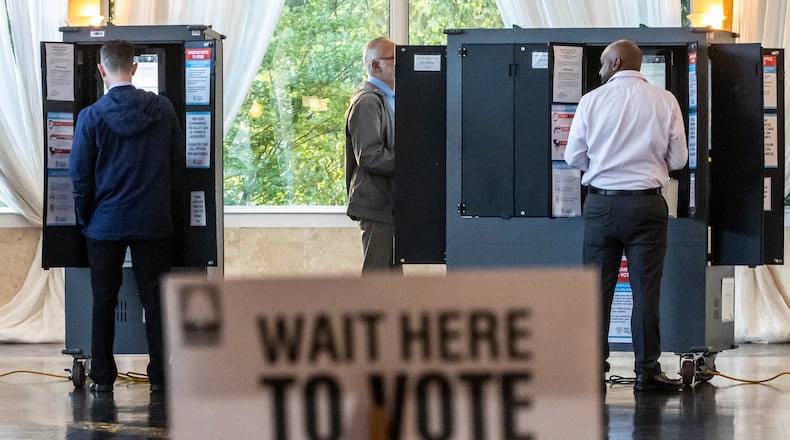On a Georgia election day with packed ballots, solid turnout and short lines, the biggest hiccup came when the state’s voter information page buckled under the load of high traffic.
The My Voter Page went offline for about an hour during the primary Tuesday afternoon, leaving voters unable to check their precinct locations, find registration information and view sample ballots. Voting at precincts wasn’t affected.
Election officials say they’ll be prepared for the presidential election in November, when millions more people are expected to participate compared with the primary.
The problem occurred because the website’s vendor, Salesforce, wasn’t prepared to handle so many thousands of users at once, said Gabriel Sterling, chief operating officer for the secretary of state’s office.
“They have more people hitting the My Voter Page than anticipated for today, and that’s a good lesson learned for the future when we have a big election in November,” Sterling said.
Otherwise, the focus of the primary was on the candidates and the voters.
Hundreds of candidates were running across Georgia for Congress, the Supreme Court of Georgia, the General Assembly and local offices, such as prosecutors and county commissioners.
Fani Willis, the prosecutor in Fulton County’s election-interference case against former President Donald Trump, faced one Democratic Party rival. Fulton Superior Court Judge Scott McAfee, who is overseeing the case, was being challenged by Robert Patillo, a civil rights attorney and talk radio host, in a nonpartisan race.
Election officials said turnout appeared to be higher than the presidential primary in March, when about 879,000 people participated. Turnout in Tuesday’s primary was expected to exceed 1 million, including 551,000 early voters.
After casting their ballots, many metro Atlanta voters said they were more motivated by issues that are important to them — such as crime, abortion and taxes — than a specific race.
Natasha Vorspel-Rueter, a Decatur voter who works in technology for an insurance company, said she picked candidates that prioritize reproductive rights and gun control.
“I’m concerned about Georgia’s stance on guns,” Vorspel-Rueter said after voting at The Church at Decatur Heights. “I’ve got two small kids who attend City Schools of Decatur, and I’m worried it could happen to them.”
Credit: Contributed
Credit: Contributed
Another voter, Michelle Hyland of Buckhead, said she voiced her support for nonbinding Republican questions on the Fulton County ballot that survey support for issues such as eliminating income taxes and bathroom use by transgender people. She said she voted “no” on a question asking whether biological men should be allowed to use women’s restrooms.
“It’s not anything against the (transgender community), not at all. I accept people as they are. But in my opinion there needs to be separate bathrooms, even if we need to build a separate bathroom,” said Hyland, an accountant.
Mail delays caused problems for some absentee voters whose ballots weren’t received at election offices by Tuesday, and Secretary of State Brad Raffensperger encouraged them to vote in person instead.
“We’ve worked with the counties to make sure they had the resources to keep those lines short. We understand how important it is,” Raffensperger said. “No one has an excuse not to vote today.”
Credit: Adrianne Murchison
Credit: Adrianne Murchison
Though turnout was light at the Johns Creek Environmental Campus in Roswell, voters said it’s their civic duty to cast their ballot.
Wesley Thompson, 62, said he wants to set an example for his two children who are in their early 20s.
“That’s the age group that’s the most apathetic, I think,” said Thompson, who works in the computer software industry. “I always tell myself that I can’t complain if I don’t vote.”
In some cases, the primary decided the winner in races where candidates don’t face an opponent from another party and in nonpartisan judicial races.
Runoffs will be held June 18 in multicandidate races where no one receives more than half of the votes cast.
Candidates who win their partisan primaries will advance to the general election in November, alongside presidential candidates Joe Biden and Donald Trump.
Keep Reading
The Latest
Featured






